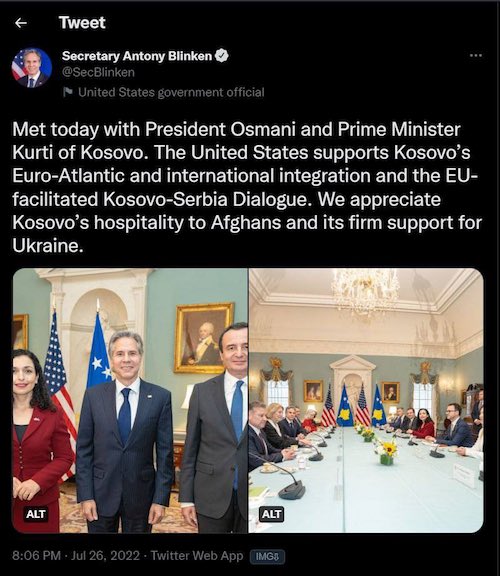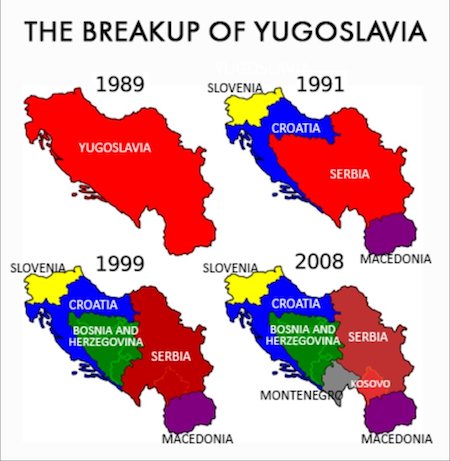The Balkans may look like a sideshow but it's not as we learned 100 years ago.
Superpowers just do not declare wars on each others. They realize the danger and do their best to mitigate the risk. So if you want to generate a war, you need to proceed methodically. Very much like a fire! inflame some straw in a corner, add some twigs above, let simmer for a while and when it's red enough throw in the big logs.
Theater Opening
Guest Post by

If you’re Chinese or Russian, and you watch videos of the top three “most powerful” people in the US, Biden, Kamala and Pelosi, what do you think? You think all three are incoherent and should not be anywhere near any decisive, let alone nuclear, lever.
If you’re anybody anywhere, and you look at the top three “most powerful” people in the world, Xi, Putin and Biden, what do you think? You think two of them have got it together (nothing to do with you liking them or not), and one can’t even read coherently from a teleprompter.
Nowhere near half of Americans understand these two things to be true, but probably some 90% of Chinese and Russians do, as well as a vast majority of people in other non-US/NATO/EU countries.
Another threesome: Sergei Lavrov (Russia), Tony Blinken (US) and Liz Truss (UK) are all foreign ministers (or Secretaries of State, give the beast a name). Who would you trust to represent your own interests best in the field of diplomacy? It’s not even a question, is it? If the US or UK had a Lavrov, he would be their man (he would most likely decline). But they don’t. The US has a nobody (they have lots of those!) in the role, and the UK has someone with zero qualifications who dreams of getting the top job.
The world outside of the G7 or G20 (give the wheel a spin) sees this happening. Is it any wonder they clamor to be part of BRICS? The “collective west” is fast finishing off itself, and yes, you’re right, that is a dangerous moment. It’s also why it very much looks like the “collective west” is trying to open a second theater of war in Europe. One that looks a lot like the one they opened in Ukraine. And the EU, to its utter shame, does nothing to prevent this from happening – on its “own” soil!.
I know, there’s Crazy Nancy on her way to Taipei as well as we speak, we’ll get to that yet. Imagine: you’re 80-odd years old, and you want your legacy to be WWIII. Not your grandchildren, but live nukes. Just imagine that.
Kosovo’s unilateral secession from Serbia was recognized by the “main Western powers” in 2008. But not China, Russia, or the UN!. Not too long after Bill Clinton’s NATO bombed the heebeejeebees out of former Yugoslavia in 1990. Just because they could. Today, the US -and NATO- try to use a tiny sliver of former Yugoslavia to ignite a major fire in Europe, a second fire besides Ukraine.
Kosovo is the size of half a postage stamp, only two US states are smaller, Rhode Island and Delaware. 1.8 million people live there, it’s like one NYC borough. But you can use the historic hatred to rekindle the flames. Right, Blinken? Well, turns out there are still some Serbs living in Kosovo, because that’s where they grew up.
The brilliant Kosovo PM now has the fantastic idea to start a fight with these Serbs, over the fact that their cars have Serb license plates and they themselves have Serb IDs, a whole 14(!) years later. Yeah, that’s worth a fight, obviously.
So America’s “top diplomat” Blinken invited Kosovo president Osmani and PM Albin Kurti to DC last week.

I’ll let some people other than me explain this to you. First, political analyst Alexandar Pavic:
In Kosovo As In Ukraine, The Same Western ‘Invisible Hand’ Foments Conflict
In addition to the conflict in Ukraine, Europe is now faced with the prospect of renewed conflict in Kosovo, Serbia’s breakaway province (officially named Kosovo and Metohija according to the Serbian constitution). Kosovo’s unilateral secession was recognized by the main Western powers in 2008. This came nine years after NATO’s attack on Serbia and the Federal Republic of Yugoslavia, after which NATO forces occupied the province and helped install an ethnic Albanian-led government dominated by former members of the Kosovo Liberation Army terrorist organization.
The current crisis was triggered by Kosovo’s ethnic Albanian Prime Minister, Albin Kurti, who initially wanted to force the majority Serb population in the north of the region to accept Kosovan license plates and ID papers starting from August 1, and to ban entry to the province or issue temporary papers to travelers with Serbian-issued plates and documents.
Kurti attempted a similar stunt in September 2021, triggering a crisis where local Serbs in northern Kosovo organized roadblocks and Kosovo police reportedly beat up and intimidated Serb civilians, while the authorities in Belgrade put the Serbian military on high alert and ordered overflights by fighter planes over the administrative border between Serbia proper and Kosovo. The EU eventually brokered a temporary agreement, pending a final deal that was supposed to have been reached by April 2022, under EU auspices. However, nothing has come of that.
From Kosovo to Ukraine, it seems there’s a pattern regarding agreements in which Western powers have a hand. Since the start of this year’s special military operation in Ukraine, Russian officials have repeated time and again that the West had never pressed Kiev to fulfill its part of the 2015 Minsk 2 peace agreement, intended to end Kiev’s standoff with the Donbass republics. Recently, former Ukrainian president Pyotr Poroshenko openly admitted that Ukraine never intended to fulfill the agreement but was merely buying time until it could build up an army capable of overrunning Donbass.
The situation with Kosovo is not much different. The EU brokered an agreement between Pristina and Belgrade in April 2013, the so-called Brussels Agreement, by which Serbia was supposed to dismantle its “parallel” police and judicial structures in Kosovo and convince the Kosovo Serbs to accept integration into the Kosovo police and legal system, without recognizing the territory’s independence. And the Belgrade authorities did this, despite a large public outcry over the move.
However, there was a second part to the agreement, by which Pristina was obligated to form an Association of Serb Municipalities, with substantial local powers and ties to Serbia proper. The Albanian part of the Brussels Agreement has not been fulfilled to the present day. Or, as Serbian President Aleksandar Vucic noted on July 31, that 3,390 days have passed since the Brussels Agreement was signed, and still no sign of the Association.
As in the case of Ukraine, the collective West has put absolutely zero pressure on the side it supports to fulfill its part of a signed international agreement. And again, as in the case of Ukraine, this has encouraged Pristina to take an increasingly belligerent stance, which may very well lead to a more serious conflict.
There’s an additional ingredient to the Kosovo mix, thanks to the Ukraine conflict. Namely, the Serbs – both in Serbia and in Bosnia and Herzegovina – stand practically alone among European peoples in refusing to join Western sanctions against Russia, and in consistently demonstrating open support for Russia’s special military operation in Ukraine. As a result, the government in Belgrade has been under constant, increasing pressure by the main Western capitals, as well as the EU and NATO, to change its policy and join the West’s collective economic suicide.
Since Belgrade has proven to be a tough nut for the West to diplomatically crack when it comes to opposing Russia, it’s not at all far-fetched to imagine that the Kosovo Albanians just might be seen by the West as a useful tool by which to additionally turn the screws on Belgrade. In the same cynical way in which the unfortunate Ukrainians are being used to pressure and weaken Russia.

Next, from RT, about Richard Grenell. No love lost on my part about him, but he did negotiate a bunch of peace deals, and knows the territory much better than Blinken.
Trump’s Kosovo Envoy Slams US Over Crisis
Richard Grenell, who negotiated a Kosovo-Serbia deal under the Trump administration after a turn in charge of the US intelligence community, blamed the “reckless” prime minister in Pristina for the renewed tensions with Belgrade on Sunday and slammed the State Department for enabling him. “What’s happening in the Balkans isn’t Russia. Whoever says this to you is trying to manipulate you,” Grenell tweeted on Sunday evening. “This is about Albin Kurti trying once again to give it [to] Serbia. He is living in the past.”
“The people of Kosovo want peace and jobs, Albin. Stop picking fights,” Grenell added. Serbian military was placed on high alert and local Serbs put up roadblocks earlier in the day, after Kosovo police showed up at two administrative crossings with Serbia, intending to enforce Kurti’s decision to confiscate Serbian license plates and documents. This would have effectively cut off the remaining Serbs living in the north of the breakaway province.
According to Grenell, this was all about Kurti “making unilateral moves to reject Serbian IDs and license plates inside Kosovo,” which he called “unnecessary.” Describing the PM a “far left radical and experienced fascist,” Grenell further called his actions “foolish” and “reckless,” and urged Serbian leaders to “not take the bait.” “Even the Albanians know Kurti is the problem,”Grenell tweeted. He also blamed Secretary of State Antony Blinken, who met with Kurti and Kosovo president Vjosa Osmani earlier in the week.
US President Joe Biden has “ignored the Balkans,” the envoy added, pointing out that he had negotiated multiple agreements between Kosovo and Serbia under President Donald Trump, trying to overcome the conflict through economic cooperation. Grenell also accused the EU of orchestrating war crimes charges against Kosovo President Hashim Thaci to punish him for working with Trump – resulting in Kurti and Osmani taking power.
And then Fyodor Lukyanov, the editor-in-chief of Russia in Global Affairs, chairman of the Presidium of the Council on Foreign and Defense Policy, and research director of the Valdai International Discussion Club.
Why Are Serbia And Kosovo On The Brink Of War Again?
Tensions between Belgrade and Pristina occur regularly, as a result of the fact that the Kosovo issue has not been resolved since 1999, when the province de facto gained independence after the US-led NATO campaign against the former Yugoslavia. However, this time there is a risk of more or less routine friction escalating into a dangerous conflict, because the context has changed dramatically.
The problem of Kosovo was solved at the end of the twentieth century in strict accordance with the then dominant approach, and in the seeming absence of an alternative. Disputes in most of Europe (ie. outside the former USSR) were settled according to the EU’s ideas of fairness, and where they could not be worked out amicably, pressure was exerted on those who rebelled, up to the use of military force (primarily American, as always).
[..] it was the EU that regulated the processes taking place locally, and, in general, this setup was taken for granted. Moreover, other powers which have been traditionally active and important in the Balkans – Russia and Turkey – indicated their presence (sometimes quite clearly), but did not pretend to have a decisive voice in the way things were arranged. This framework also defined the room to maneuver for the countries of the region, including those who were most loudly dissatisfied, like Serbia.
Now two main circumstances have changed. First, the EU is in such a vulnerable state that it is not ready to take full responsibility for the extremely complex political situation in its immediate periphery. It cannot promise membership, and more precisely – even if such a pledge were made, it doesn’t guarantee anything.
The EU’s management of the central Balkan problems – in Bosnia and Kosovo – has not led to the desired outcome over the past quarter of a century. Thus, it’s all the less likely that it will work out now. Because the second circumstance is that Russia and the West (the EU plus the US and NATO) are in a state of acute confrontation.
As a result, there is no reason to expect Moscow’s assistance in resolving the situation (be it Kosovo or Bosnia). Right now, the West’s favorite practice of “selective interaction” (we work together with Russia where we need it, we refuse to engage on other issues) can no longer be applied. There will be no cooperation: Russia and the West will be on opposite sides of the barricades everywhere, no matter the issue at hand. We are in a systemic cold war. And this reality can greatly influence what will happen in the Balkans.
The question is to what extent regional actors have retained their passion for showdown, revenge or expansion. There are suspicions that this zeal has been exhausted and emasculated. But if it still burns, then external forces will enter the fray this time, supporting opposing sides.
Blinken et al, which very much includes his EU counterparts, see the past struggles in the Balkans as something they can reignite at their convenience today. The initial boundaries are simple. Russia will come to the aid of Serbia. Kosovo will appeal to Albania. And then to NATO. So the idea is you got this hot cauldron, with 5-6-15 nations, and NATO can do whatever it wants in there.
But NATO has no chance in Ukraine, and it doesn’t have one in Kosovo. But it can ship billions worth of weapons in there by Raytheon. Problem I see with this genius plan is that Russia saw it coming from lightyears away. And that is the same issue as the difference between Lavrov and Blinken: they may have the same job title, but there’s no comparison.


No comments:
Post a Comment